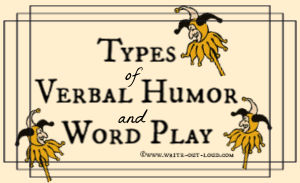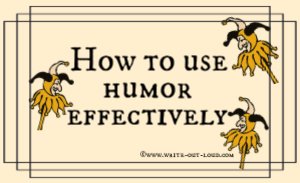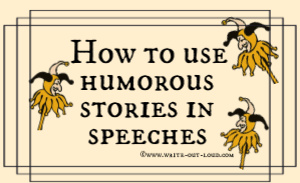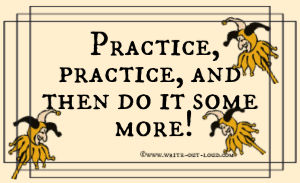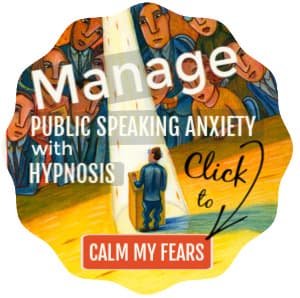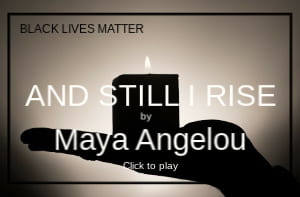Great funny speeches
5 keys to writing & delivering humorous speeches
By: Susan Dugdale | Last modified: 01-04-2023
Many of us long to give a great funny speech.
We imagine ourselves being oh, so witty. In our minds, we tell jokes effortlessly. We see our audience beam appreciatively, and hear them roar and snort with laughter in the places they're meant to. Of course the applause as we finish triumphantly is thunderous.
Sadly though, we really don't know how, or where to start to write, or deliver one.
If that's you, this is your page!
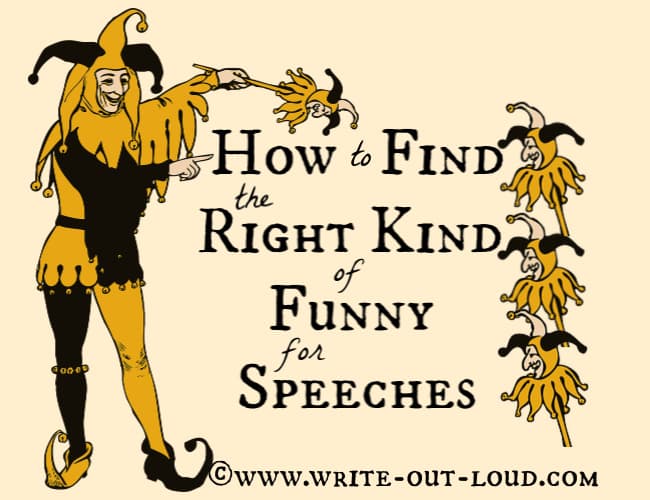
5 keys to writing & delivering great funny speeches
1. Understanding the purpose of your speech
Is the primary goal of your speech to be funny or is it to impart knowledge with humor?
Unless you are a stand-up comedian, the main purpose of your speech is probably to give your message in an entertaining way, which will include humor.
This means that you will use humor as a tool to help you communicate, to carry your message to the audience. It is not the main focus of your speech but an enjoyable addition.
The more integrated the humor is with your speech subject, the more effective it will be.
Getting clear on your primary goal will help you decide how you plan, write and deliver your speech.
2. Understanding humor
Humor comes in many shapes and sizes from small smirks to full blown belly laughs. To use it effectively it helps to have an understanding of its varieties. This enables you to choose what will suit your audience, your speech topic, and the occasion.
Types of verbal humor and word play
Visit my page types of verbal humor and word play for definitions and examples of puns, irony, hyperbole, innuendo, spoonerisms and more. Much more!
Verbal humor is deliciously silly stuff. Like this wonderful double malapropism that's kept me chortling for umpteen years. It was in a student's essay. (Thank you Tina.)
"The statue of Liberace and the Star Strangled Banger"
Sometimes marking is glorious!
Physical humor
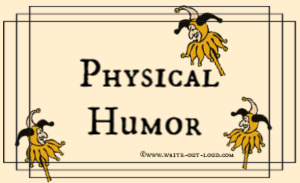
My page on physical humor will give you an introduction to using gesture or body language as an aid to laughter.
You'll find explanations and exercises to help you explore using your body to express yourself.
Finding the confidence to play with physical humor, to allow yourself to experiment, will reward you enormously. Because, as I say in the introduction to the page:
"Physical humor has an immediacy that by passes language completely and goes straight to the funny center. It transcends age groups, gender and culture."
It's the language everybody understands.
Verbal and physical humor are the core elements you'll bring together when crafting your speech.
3. Integrating humor
What works, what doesn't, and why?
We know adding humor to our presentations makes them more effective and more memorable but sometimes the more we try, the worse it gets. The jokes fall excruciatingly flat.
You can avoid that pain by reading how to use humor effectively.
Those great funny speeches you admire bring more than a knowledge of the basic "ha-ha, hee-hee" building blocks together.
4. Storytelling & characterization
How to use humorous stories or anecdotes in speeches. There's three pages to browse. All of them will deepen your understanding.
- story telling in speeches - choosing & shaping a story. What story fits your speech purpose, your audience and your content?
- story telling set-ups
Having a great funny story to tell is good. Having a great introduction or set-up to it, is even better. Find out how do that well.
- characterization techniques enable you to become the characters in your story. Your stories are so much richer for it.
5. Rehearsal/practice = great funny speeches
Having prepared your speech, you're ready for rehearsal.
Practice, and then more practice, will hone and refine your speech. You'll find out what works, what doesn't, where you need to edit and why.
Truly, I'm not exaggerating when I say that practice can make all the difference between being splendiferously successful and disappointment.
Read my story about giving a humorous speech. That ought to convince you! This was a lesson straight from the "should-have-known-better department".
The tips you need for rehearsing are below.
- how to rehearse -a step by step guide to get the best out of the time you spend practicing.
- vocal variety - how to use your voice effectively
This page also has ongoing links information and exercises for using pauses, varying the rate of speech, how to speak clearly and more - all of which are needed for humor.
Other resources for preparing great funny speeches
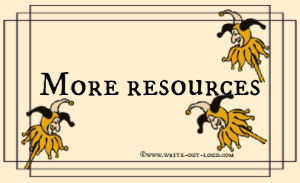
*Videoed speeches from Toastmaster's Humorous Speaking Contests
Among other things like content, structure, choice of vocabulary, use of voice, they're good for seeing how gesture and movement helps tell the story.
(What I find really interesting about these is how personal preference plays into which I think are great funny speeches, and which I don't. I can see and hear competency and confidence. That's a base level requirement. However, beyond that individual sensibilities take over. ☺)
*Tony Audrieth's The Art of Using Humor in Public Speaking.
This is an in-depth exploration of the aspects that combine to successfully deliver a funny speech. You'll find examples of humor types, notes of delivery and practice as well as suggested sources for quotes and jokes. I think it's superb - an immensely valuable resource.
*A useful collection of fun speech topics - good for starters if you're stuck.
- Return to top of great funny speeches
